Iran's Raisi Calls On Japan To Release Frozen Funds
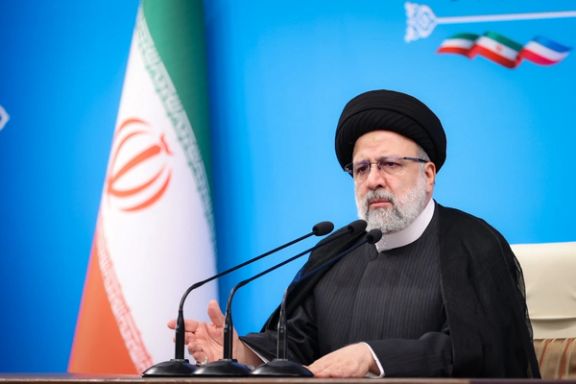
Iranian President Ebrahim Raisi called on Japan on Tuesday to display its independence from Washington by releasing Tehran's frozen assets despite US sanctions.

Iranian President Ebrahim Raisi called on Japan on Tuesday to display its independence from Washington by releasing Tehran's frozen assets despite US sanctions.
"Japan should act independently from the US by releasing our blocked funds," Raisi said when asked by a Japanese reporter about $1.5 billion of blocked funds in Japan.
He then appeared to contradict himself, saying, "I must clarify that our Central Bank earlier said we only had unjustly frozen funds in South Korea. All other assets abroad are at the disposal of Iran's Central Bank.”
Tehran and Washington have reached an agreement in which five US citizens held in Iran will be freed in exchange for $6 billion of Iranian assets frozen in South Korea.
On August 10, Iran allowed four detained US citizens to move into house arrest from Tehran's Evin prison. A fifth was already under home confinement. They are expected to leave Iran when the money reaches accounts in Qatar.
The deal has led to sharp criticism and questioning by US lawmakers and many Iranian Americans, who say the Biden administration made a deal in secret and it is not clear what other concessions it has made to the Islamic Republic. Many critics also say that payment of ransom for hostages will endanger the lives of other Americans by emboldening the Iranian regime and other adversaries.
(With reporting by Reuters)
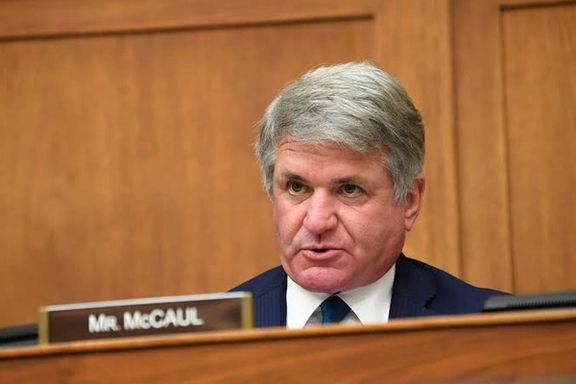
House committee chair Michael McCaul has expressed concern over an alleged US memo obtained by Iran’s government, while the State Department refuses to comment.
Tehran Times, an Iranian government newspaper August 27 published a US government memo purportedly sent to US Iran envoy Robert Malley informing him of his security access suspension.
US House Foreign Affairs Committee chairman McCaul issued a brief statement on Monday voicing deep concern that an alleged State Department memo has reached the Iranian government, while the US Congress knows very little about why Malley has been suspended without pay.
“If this memo is authentic, it is extremely concerning especially since this is not the first time the Iranian regime’s mouthpiece has appeared to have sensitive U.S. government information recently while Congress is kept in the dark,”McCaul said in his statement.
The State Department refused to comment on Monday when asked by Iran International. A spokesperson said, “We are aware of these reports,” but “The department does not comment on internal matters.” The Spokesperson added, “We have nothing further to share at this time due to privacy considerations.”
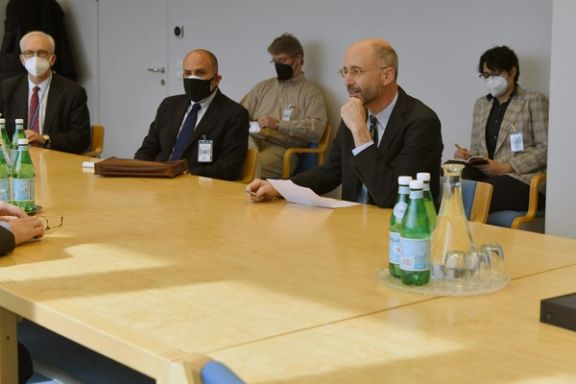
Iran International first reported June 29 that Malley had been absent for a considerable time, his security clearance was suspended, and he is under investigation related to his handling of classified documents. The Involvement of the Federal Bureau of Investigation was also reported, although until now no official details have been announced, except that Malley is on “unpaid leave.”
The document published by Tehran Times, purportedly from Erin Smart, Director of the State Department's Bureau of Diplomatic Security, Office of Personnel Security and Suitability, cites three reasons for Malley's suspension: “Personal Conduct,” “Handling of Protected Information,” and “Use of Information Technology.” The memorandum further underscores that Malley's “continued national security eligibility is not clearly consistent with the interests of national security."
While Iran International has yet to independently verify the document's authenticity, it has been informally corroborated by two congressional sources, who have described it as seemingly "authentic." Politico also reported that a source “familiar with the investigation into Malley who has seen the original memo…that the Tehran Times’ version appeared to match that original.”
The Biden administration's refusal to provide more information to Congress even in a confidential briefing, arguing that privacy considerations are a hindrance, has led McCaul to threaten a subpoena.
“I have requested transparency from the State Department on the ongoing Robert Malley saga and will continue to demand answers,” the Chairman said in his statement.
He concluded by suggesting that there could be a security breach at the State Department. “This latest chapter raises serious questions about how the regime obtained this potentially authentic document and what other sensitive or classified information they may have. The State Department needs to do a top to bottom security review, because I am concerned they have a leak.”
Other Republicans, who were already angry about the Biden administration agreeing to release $9 billion of Iran’s funds from South Korea and Iraq, also started to weigh in.
“It is shocking and, to my knowledge, unprecedented that a propaganda arm of Iran’s terrorist regime got its hands on what appears to be a ‘Sensitive But Unclassified’ April 2023 memo related to the suspension of Special Envoy Rob Malley’s security clearance,” Sen. Bill Hagerty, member of the Senate Foreign Relations Committee said in a statement.He asked for the State Department Inspector General to investigate how the Tehran Times obtained the Malley memo.

The leader of Canada’s Conservative Party, running to be the next prime minister, has vowed to “kick out” Iran’s Revolutionary Guards if he wins office.
Pierre Poilievre is also the leader of the country’s Official Opposition -- the party possessing the most seats in the House of Commons that is not the governing party. The Conservative Party of Canada, or the Tories, is leading in opinion polls and projections for the upcoming federal election, slated to take place on or before October 20, 2025, to elect members of the House of Commons to the 45th Canadian Parliament.
After a campaign event among Iranian Canadians on Sunday, Poilievre said on his X account, “Inspiring a group of freedom-loving Canadians who want to ban IRGC terrorists and kick regime thugs out of Canada. That is what I will do.”
Echoing the same sentiments, Anna Roberts -- another Conservative Party parliamentarian – said after another campaign event for Poilievre that “IRGC terrorists should not be free to roam our streets and should be kicked out of Canada.” “A common sense Conservative government will bring home safety in our streets,” she added on her X account.
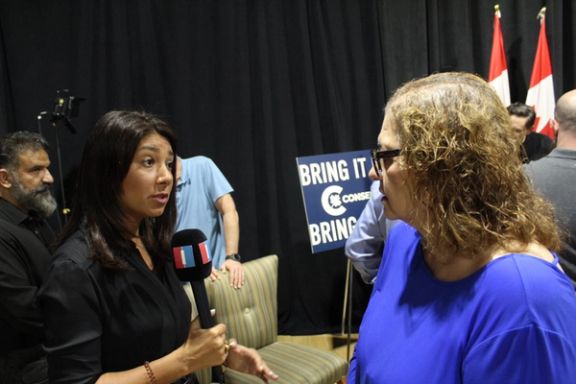
The promise has resonated with a large group of Iranians who have been critical of Canada's Liberal Prime Minister Justin Trudeau over his failure to designate the IRGC as a terrorist organization. There are 73 groups on Canada's terrorist list, but the Revolutionary Guard is not one of them. Ottawa has intensified measures against the regime in recent years, especially following the downing of a civilian airliner by IRGC in 2020 killing dozens of Canadians and the nationwide protests following the death of 22-year-old Mahsa Amini in the custody of police.
Pundit Babak Taghvaee said earlier in the week, “Canada is a Paradise for IRGC terrorists, authorities of Iran's Islamic Regime and their supporters.”
On Saturday, a video went viral in which a supporter of the Iranian regime chanted slogans in support of the Islamic Republic and its leaders Ali Khamenei through a megaphone as he passed through a neighborhood with a lot of Iranian shops and businesses.
So far, Canada has sanctioned 170 Iranian individuals and 192 Iranian entities, including key IRGC and members of the regime’s security, intelligence and economic apparatuses. In 2012, Canada designated Iran as a state supporter of terrorism under the State Immunity Act.
In June, Canada's Senate passed a non-binding motion to designate the the Guards as a terror organization. Ratna Omidvar, an independent senator for Ontario who fled Iran in 1981 and has been campaigning fiercely against the IRGC, said at the time that “the crimes of the Islamic regime and the IRGC go beyond the borders of Iran", citing the contribution of the IRGC to Russia's brutal invasion of Ukraine, for which Iran has supplied kamikaze drones. In June 2018, the Canadian parliament passed another similar motion, introduced by MP Garnet Genuis, to designate the IRGC but the government did not follow up on the action.
The federal government has referred to the IRGC as a terrorist organization, described its leadership as terrorists, announced measures to make its senior members inadmissible to Canada, and has listed the outfit’s extraterritorial expeditionary division Quds Force as a terrorist entity. However, despite numerous calls from the federal Conservative party, activists and even US lawmakers as well as the families of victims of the Ukrainian flight that was shot down by the IRGC, the government has refused to designate the whole entity as a terrorist entity under the country’s Criminal Code.
The airliner was shot down by two air-defense missiles fired by the IRGC as it took off from Tehran’s Imam Khomeini International Airport. All 176 passengers and crew, including 63 Canadians and 10 from Sweden, as well as 82 Iranian citizens on the plane died in the disaster.
Canadian officials said last year that the designation of the group would be too much of a “blunt instrument” that could punish innocent people in Canada who were conscripted into the IRGC as part of their mandatory military service.
Following years of campaigning by human rights activists and Iranians dissidents, Canada finally announced sanctions last November against the IRGC, permanently banning over 10,000 of its officers and other senior officials from entering Canada. However, the ban on regime officials “applies to those who were senior officials at any time from November 15, 2019, onwards,” practically giving the greenlight to a large number of regime officials to reside in Canada.
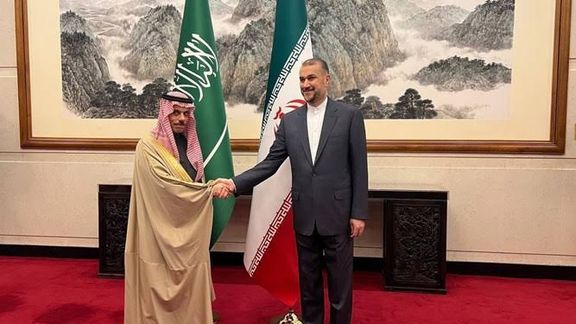
Efforts to address the hosting predicament surrounding the matches involving Iranian and Saudi Arabian football teams have been undertaken by the foreign ministers of both nations.
Since 2016, matches between representatives from Iran and Saudi Arabia in the Asian Champions League have been conducted on neutral territory, as mandated by the AFC executive board. Recent developments, however, have given rise to speculation about potential alterations to this arrangement.
According to reports, the Asian Football Confederation has initiated communication with the football federations of Iran and Saudi Arabia, with the aim of collaboratively designating a host location in a third country.
Mehdi Taj, the head of the Iran Football Federation, revealed during a sideline conversation at the Football Board Assembly that "Iran's Foreign Minister engaged in discussions with his Saudi Arabian counterpart to address the issue of holding matches between the two countries' representatives on neutral ground."
In contrast, Reza Darvish, the CEO of Persepolis football club, expressed his club's rejection of the directive received from the federation to select a host for Al-Nasr FC. He further communicated that Persepolis club is actively communicating with the football federation through correspondence, with the goal of retaining the privilege to host the match in Iran.
These negotiations occur against the backdrop of a significant diplomatic rapprochement facilitated by China in March. This initiative brought an end to years of animosity between Iran and Saudi Arabia, which had strained regional stability in Yemen, Syria, and Lebanon. On June 7, 2023, Iran formally reopened its embassy in Saudi Arabia, marking a pivotal step towards the restoration of diplomatic relations.
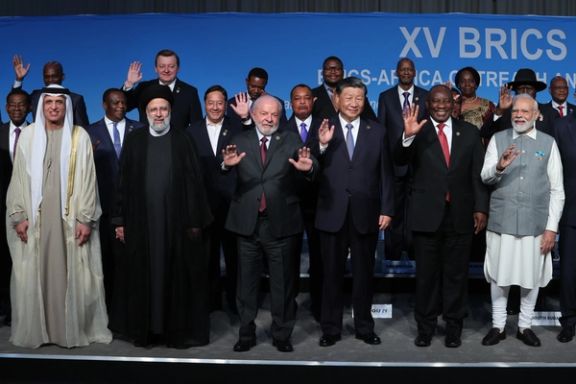
Amid Islamic Republic's international isolation, a few individuals with close ties to the regime appear optimistic about the country's recent inclusion in BRICS.
However, observers and experts in Tehran are starting to question the significance of this membership, particularly its unclear economic implications that Iranian officials have yet to elucidate.
There have been numerous social media posts about President Ebrahim Raisi's incoherent mumbling upon his return from South Africa at Tehran's airport. It can hardly be translated into any language including Persian, as it sounds like Greek to anyone, including Persians.
Nour News, a media outlet linked to Iran's Supreme Council of National Security, has offered this seemingly sophisticated explanation in a Threads post: "Six new members have been added to BRICS from the continents of America, Asia, and Africa. With these additions, 45 percent of the world's population and the owners of more than 30 percent of the world's gross product are now part of this alliance. This development signifies the breakdown of the old order that was rooted in geopolitics and the rise of a new order founded on geoeconomic cooperation."
The numbers, whatever practical implications they hold for Iran, are primarily driven by the substantial populations of India and China. However, the potential benefits of these figures for Iran remain uncertain, especially while the US sanctions are still in effect.

Kourosh Ahmadi, a former Iranian diplomat at the United Nations told Entekhab website in Tehran, " We cannot hold any hope of benefiting from the financial resources of BRICS as long as US sanctions remain in place," he emphasized. He went on to add, "Iranian officials must not be consumed by illusions regarding membership in the Shanghai Cooperation Organization and BRICS. Should they fall into such illusions, their membership could prove more detrimental than not being members at all"
Ahmadi pointed out that BRICS members decided to magnify the alliance's importance after several years of disputes particularly between India and China. India had concerns about the possible anti-Western tendency of BRICS. Ahmadi further noted that some of the pro-West and pro-East countries invited to the South Africa summit, were not interested in becoming members.
The interactions between the leaders of China and India were notably less than friendly. In contrast, while Saudi Arabia was granted membership, Riyadh expressed its intention to deliberate on the issue. Evidently, Riyadh does not share Iran's urgency to forge alignments with either China or the United States.
Ahmadi expressed doubt that, in the long run, expanding the number of its members would necessarily elevate the significance or influence of BRICS, and added, "I can hardly contain my laughter when I hear Iranian officials suggesting that BRICS will undermine the international dominance of the US dollar."
According to Entekhab it is doubtful that Iran could benefit from its BRICS membership without finalizing the negotiations with the United States and Europe over the 2015 nuclear deal (JCPOA). Ahmadi defined BRICS simply as "a forum for dialogue." He added that it even lacks a secretariat and a charter. Its founders defined it as "a way to promote dialogue and cooperation between the member states." He further added: "It is something like the Non-Aligned Movement."
Ahmadi reiterated that "Iranian officials should understand that without sorting out the nuclear issue through negotiations and without accepting the terms of the Financial Action Task Force (FATF), membership in organizations like BRICS or Shanghai cannot help Iran."
Regarding the Iranian government's propaganda, he said: "The government has every right to promote itself, but independent and knowledgeable individuals are also free to accept or dismiss it."
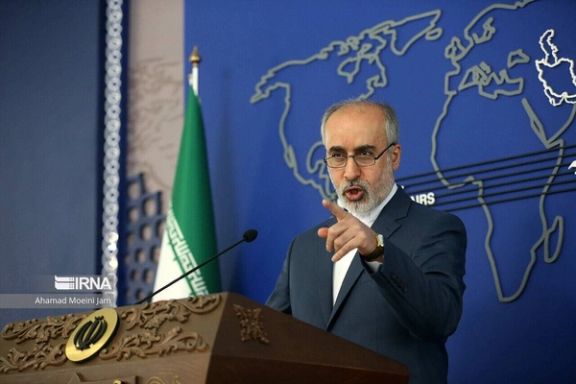
Iran called on the United States to clarify its association with Jamshid Sharmahd, an Iranian-German national sentenced to death in Iran after a State Department official met with his family.
Foreign Ministry Spokesperson Nasser Kanaani stated, "The United States government must respond to the Iranian government and people regarding the individual who is recognized and condemned in court for terrorism."
He added that Sharmahd, “responsible for a recognized terrorist group, has committed numerous acts of terrorism against Iran." He specifically alleged that Sharmahd had a role in planning and executing bombings in Shiraz, resulting in deaths and injuries.
Kanaani's remarks followed a meeting between US envoy for Iran, Abram Paley, and the family of Jamshid Sharmahd. Sharmahd, a German Iranian citizen abducted by Iranian agents in Dubai, in 2020, was sentenced to death in Iran in February. He was convicted of leading a pro-monarchist group linked to a deadly 2008 bombing.
Paley succeeded Rob Malley as US envoy for Iran, with Malley placed on unpaid leave due to security protocol violations. Sharmahd's family, including his son and daughter, Gazelle and Shayan, have been actively seeking US officials' attention through sit-in protests outside the State Department to advocate for their father's case.
A controversial deal exchanging five US citizens held hostage by Iran for the release of $6 billion in Iranian funds frozen in South Korea has sparked criticism, especially due to the exclusion of Sharamhd, who hold US permanent residency and another prisoner. Former hostages and analysts argue that the deal could embolden future hostage-taking incidents.
Sharmahd's health has deteriorated during his imprisonment, with human rights organizations expressing concern. He has been held in solitary confinement and denied fair legal proceedings. In February, Iran's judiciary handed down a death sentence.






